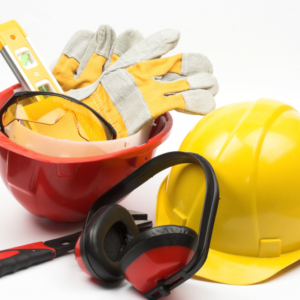We will share two ways how to choose chemical-resistant gloves, kindly check my comments below:
First:
Comprehensive knowledge of safety gloves by yourself, just as below:
Assessing the work environment and conducting a risk assessment:
- Understand the specific work environment where the gloves will be used and the potential exposure to chemicals and hazardous substances. Consider factors such as the nature, concentration, temperature, and duration of chemical contact.
- Conduct a risk assessment to analyze potential hazards and risk levels.
Understanding protective materials and chemical resistance:
- Research the chemical resistance of different protective materials, including latex, nitrile, chloroprene, chlorinated polyethylene, and polyvinyl chloride. Each material offers unique chemical resistance and protective properties.
- Refer to relevant standards and guidelines to understand the permeation and resistance requirements of different chemicals for glove materials.
Determining the required protection level and standards:
- Based on the work environment and the nature of chemicals, identify the required protection level and the applicable standards. Examples include chemical permeation resistance, chemical permeation resistance combined with cut resistance, chemical permeation resistance, cut resistance, and puncture resistance.
- Consult international standards such as EN 374 in the European Union and ASTM D6319 in the United States to understand the required protective performance and certification criteria for gloves.
Considering comfort and flexibility:
- Comfort and flexibility are essential for prolonged glove usage, especially for tasks requiring dexterity.
- Look for gloves that are soft, properly fitting, and allow for ease of hand movement without compromising work efficiency.
Evaluating durability and longevity:
- Gloves should be durable to maintain their protective performance even with extended use and multiple washing cycles.
- Refer to product specifications, user feedback, and experimental data to assess the durability and expected service life of the gloves.
Referencing real data and case studies:
- Consult independent organizations, industry reports, and laboratory test data to compare the performance of different brands and models of chemical-resistant gloves.
- Seek out case studies from similar work environments to understand the effectiveness and user experiences with specific chemical-resistant gloves.
Considering individual differences and special requirements:
- Hand sizes and shapes vary among individuals, so look for gloves that offer different sizes and adaptability to accommodate diverse hand sizes.
- For special requirements such as allergies or chemical sensitivities, select appropriate hypoallergenic gloves or gloves that provide additional protection.
In summary, selecting the right chemical-resistant gloves involves considering the work environment, conducting a risk assessment, understanding chemical resistance, determining the required protection level, evaluating comfort and flexibility, assessing durability, referencing real data and case studies, and considering individual differences and special requirements. By researching relevant data, following standards and guidelines, and accounting for individual needs, you can choose chemical-resistant gloves that effectively ensure workplace safety and protection.
Second:
Choose a reliable, professional PPE supplier: Solving the Challenges of Customer Decision-making
When it comes to selecting the appropriate personal protective equipment (PPE), customers often face numerous challenges. From understanding technical specifications to navigating through a vast array of options, it can be overwhelming. In such situations, engaging with a professional PPE supplier can provide invaluable assistance.
A reputable PPE supplier is well-versed in the industry’s intricacies and possesses the expertise needed to address customers’ specific needs. Here’s how partnering with a professional PPE supplier can solve the challenges of customer decision-making:
Expert Guidance:
PPE suppliers have in-depth knowledge of various safety products, including gloves, masks, goggles, and protective clothing. They can offer expert guidance based on their understanding of industry standards, regulations, and best practices. This ensures that customers receive accurate information and can make well-informed decisions.
Extensive Product Selection:
PPE suppliers maintain an extensive range of products from different manufacturers. This diverse selection allows customers to explore multiple options tailored to their requirements. The supplier can recommend suitable alternatives and provide detailed specifications, enabling customers to compare features and make choices that align with their specific needs.
Technical Support:
Customers may encounter technical challenges or have specific queries regarding product performance, compatibility, or certifications. PPE suppliers can provide dedicated technical support, addressing concerns and clarifying any doubts. This support ensures that customers have a clear understanding of the capabilities and limitations of the PPE they are considering.
Customized Solutions:
Each industry and workplace has unique safety requirements. Professional PPE suppliers can assess the customer’s needs, considering factors such as workplace hazards, regulations, and budget constraints. Based on this evaluation, they can propose tailored PPE solutions that provide optimal protection while meeting the customer’s specific requirements.
Streamlined Procurement Process:
Partnering with a PPE supplier streamlines the procurement process. They can manage inventory, provide reliable delivery, and assist with order tracking. This saves customers time and effort, allowing them to focus on their core operations while ensuring a consistent supply of high-quality PPE.
Stay Updated on Industry Trends:
PPE suppliers stay abreast of industry trends, emerging technologies, and product innovations. They can share valuable insights with customers, introducing them to new advancements that enhance safety and improve worker comfort. By staying informed, customers can make proactive decisions that keep their workforce protected and up-to-date with the latest safety practices.
In conclusion, collaborating with a professional PPE supplier offers a solution to the challenges customers face when selecting PPE. By leveraging their expertise, extensive product selection, technical support, customized solutions, streamlined procurement processes, and industry knowledge, customers can make informed decisions that prioritize worker safety and meet their unique requirements. Partnering with a trusted PPE supplier ensures that customers receive reliable products and ongoing support, fostering a safe and secure working environment.


